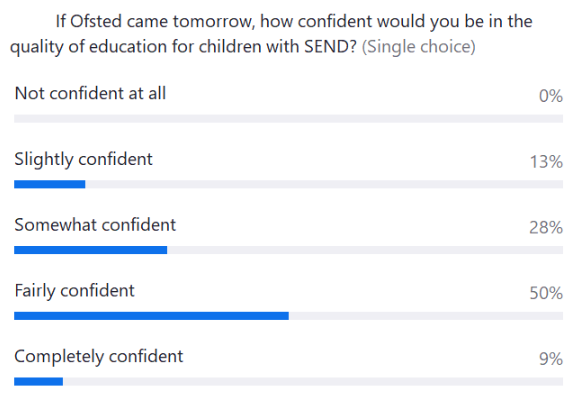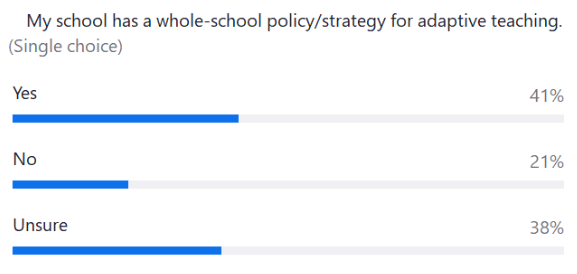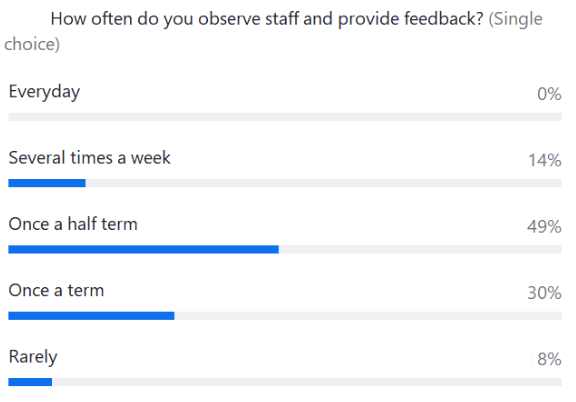Supporting Your Teachers to Create an Inclusive Classroom

This blog is based on Judicium’s Safeguarding ‘Sofa Session’ from the 11th of December, with our resident expert Rik Chilvers. This session focused on busting the myth of planning 'X different ways', empowering your SENDCO to support your teachers and unlocking the benefits of group work.
What do Ofsted want to see?
Poll 1

There are two main sources of information for what Ofsted are looking for with regards to SEND: the Education Inspection Framework and the School Inspection Handbook.
Broadly, Ofsted want to see that:- you are aspirational for learners with SEND,
- that this aspiration is driven by your curriculum and careful assessment and planning,
- that you do not narrow the curriculum of learners with SEND.
Below Ofsted's School Inspection Handbook gives us more details.
Quality of Education - Outstanding:- Pupils consistently achieve highly, particularly the most disadvantaged. Pupils with SEND achieve exceptionally well.
- Leaders adopt or construct a curriculum that is ambitious and designed to give all pupils, particularly disadvantaged pupils (including pupils with SEND), the knowledge and cultural capital they need to succeed in life. This is either the national curriculum or a curriculum of comparable breadth and ambition.
- The curriculum is successfully adapted, designed or developed to be ambitious and meet the needs of pupils with SEND, developing their knowledge, skills and abilities to apply what they know and can do with increasing fluency and independence.
- Leaders have a clear and ambitious vision for providing high-quality education to all pupils. This is realised through strong, shared values, policies and practice.
A renewed focus on inclusion
Recent information from the government suggests that Ofsted will be instructed to have a renewed focus on inclusion and are therefore likely to be looking much more closely at the provision offered to students.
Catherine McKinnell, the schools minister, said Labour’s plans included “strengthening accountability for mainstream settings to be inclusive, for instance through Ofsted, and helping the mainstream workforce to have SEND expertise”.
Currently, SEND is considered – Ofsted doesn't grade SEND separately – inspectors use what they've seen of the SEND provision to inform their judgements in other areas including:
- the intent, implementation and impact of quality of education,
- behaviour and attitudes,
- personal development
- and leadership and management.
If Ofsted consider SEND separately, as they do for safeguarding, there will be significantly more pressure on schools to ensure their provision is excellent.
High-quality teaching
As of June 2024, there are a little over 434k children in receipt of an EHCP. Much of the discourse around removing barriers for children with SEND focuses on the challenges of doing so for children with an EHCP, for whom funding from local authorities is often hard won and insufficient. Certainly, this is a valid area of concern.
However, there are over 1.2m children with SEND who do not have an EHCP. Historically, these children might have been supported by TAs but in the new economic climate, additional adults are a luxury and the needs of these children go unmet. This presents an issue because unmet needs of children with SEND can lead to increased children requiring an EHCP.
Poll 2

Differentiation and adaptive teaching
Ofsted have moved away from the language of 'differentiation', in part because of the stigma associated with it. SLT, teachers and Tas worry about how they can create six, seven, or eight different lessons to meet the range of needs their students have.
They're right to be concerned about this. After all, the SEND Code of Practice makes it clear that differentiation - or something like it - is an expectation of teachers:- Paragraph 1.24: ‘High quality teaching that is differentiated and personalised will meet the individual needs of the majority of children and young people’
- Paragraph 6.2: Schools ‘must use their best endeavours to make sure that a child with SEN gets the support they need – this means doing everything they can to meet children and young people’s SEN’
- Paragraph 6.9: schools ‘must make reasonable adjustments… to prevent them being put at a substantial disadvantage. These duties are anticipatory’
However, along with the expectation of differentiated lessons came the misplaced criteria that this should be evidenced through creating multiple worksheets or lessons-within-lessons.
The Early Career Framework gives us a different perspective:- Meet individual needs without creating unnecessary workload, by:
- Making use of well-designed resources (e.g. textbooks).
- Planning to connect new content with pupils' existing knowledge or providing additional pre-teaching if pupils lack critical knowledge.
- Building in additional practice or removing unnecessary expositions.
- Reframing questions to provide greater scaffolding or greater stretch.
- Considering carefully whether intervening within lessons with individuals and small groups would be more efficient and effective than planning different lessons for different groups of pupils.
- High quality teaching for pupils with SEND is based on strategies which are often already practised by teachers, and which can be developed through training and support.
Strategies for adaptive teaching
Metacognition
Developing children's independence can contribute significantly to the success of adaptive teaching. An important tool for independent learners is metacognition, think about explicitly teaching children how to reflect on their own learning. The core skills of metacognition are planning, monitoring and evaluation. By teaching children with SEND how to independently set goals, use checklists to track their progress and reflect on which strategies work or don't, we can give them structured approaches to overcoming the barriers to learning they experience.
Pairing a whole-school approach to metacognition with academic mentoring for key students can be a powerful combination.
Low threshold, high ceiling
In some cases, fully adapting the curriculum for a child with SEND is an appropriate strategy. However, much of the time, differentiating within the curriculum is sufficient. So, rather than having different ability groups working on different tasks, instead plan to have all children start with the same basic task but encourage some to work in more depth using more advanced vocabulary while supporting others to use writing frames and sentence starters. This inclusive approach helps to maintain engagement and fosters a sense of achievement and progress since all children are working on the same task.
Address reading
Ofsted also wants to see that you have a clear strategy for teaching reading. Several of the schools that we work with conduct a standardised reading test in key years (such as 7 and 9) to identify children who may need additional support.
This is an excellent strategy, especially when it is partnered with curriculum leads planning opportunities for children to meaningfully engage with reading in their subject. For example, this could be all subjects planning comprehension activities, considering the key texts and ensuring they are pitched and adapted effectively and considering the key vocabulary for each topic and the subject (think tier 3 and 2) and weaving these in skillfully.
Group work
The EEF has found that collaborative learning approaches, when implemented well, are a low cost, impactful strategy for improving children's academic progress. The findings show that:- The most effective collaborative learning strategies typically involve groups of 3 to 5 students working towards a common goal.
- Students require guidance and practice to collaborate effectively; it is not an innate skill.
- Activities must be meticulously planned to ensure collaboration is effective and efficient. Without careful design, some students may struggle to engage or prefer to work alone. It is crucial all students communicate and express their thoughts during collaborative tasks to gain the full benefits.
- Introducing competition between groups can enhance collaborative efforts. However, excessive focus on competition may lead students to prioritise winning over learning.
The goal for group work should be to balance academic and social demands. When there are high social demands, we should lower the academic demands and vice versa. Striking the right balance here depends on several factors, not least your understanding of the individual children in your class, but one important tip is to provide your groups with specific roles and systems to follow. This will help to reduce social demands.
Observations, drop-ins and learning walks
Poll 3

It's important to remember that the goal of observations, whether of lessons or of unstructured times, is to improve the outcomes of students. One way that you can achieve this is to align your SEND-focused observations with other strategic school priorities.
For example, if improving literacy is one of your school's development targets, you may wish to consider making this a focus of some of your observations. Practically, that might involve you considering the adaptations teachers are making to writing tasks (such as how complex tasks are broken down into stages), considering whether children have access to vocabulary banks with words from appropriate tiers and reviewing how effective these tools are at removing barriers to learning. This will enable you to provide the rest of the leadership team with insight into the successes and challenges of delivering this school priority to your cohort of children with SEND.
Sharing your focus for observations across a term, e.g., use of physical resources to remove barriers to learning, gives staff something to work towards and makes summarising your findings to SLT or giving feedback to staff at the end of the period much easier.
Levelling-up your CPD
Research shows us that leaders - i.e., those delivering the training - find inset sessions more helpful than the staff receiving them.
The most successful training often mirrors excellent teaching practices. Here are a few examples, but instructional principles like Rosenshine's will also be helpful.- Deliberate practice (really focusing in on the constituent parts of a skill before building them up into the whole - such as reviewing a lesson plan to ensure its adapted appropriately)
- Modelling and scenarios (these are particularly effective if you're training your staff how to work with specific students)
- Error correcting activities (these are a fun way to challenge misconceptions)
- Error management activities where your staff have the opportunity to anticipate what could go wrong and then collaborate on problem solving strategies
Another effective CPD practice an increasing number of schools are adopting is the use of frequent, regular short briefings and quizzes that revise and test key knowledge throughout the school year. Often, by the second half term, staff have forgotten much of the carefully planned INSET training. Regular top-ups and tests like this are effective at keeping the profile of SEND high.
Additional Info
Judicium’s SEND Support Service provides regular training – both on-demand eLearning modules and online or in person sessions. We also offer bespoke training for schools and trusts as well as a frequent 'Live at 3:45s' on topics such as ADHD and how to write effective EHCPs.
See our upcoming training sessions here.
What do Ofsted Look for when Inspecting for SEND Provision and Leadership?
If you require any SEND support in any of these steps or would like to talk to someone surrounding our SEND Support Service for your school, please do not hesitate to call us on 0345 548 7000 or email georgina.decosta@judicium.com
You can follow us on Twitter: @JudiciumSG @JudiciumEDU
If you’d like to review all of Judicium’s forthcoming sofa sessions please click here
© This content is the exclusive property of Judicium Education. The works are intended to provide an overview of the sofa session you attend and/or to be a learning aid to assist you and your school. However, any redistribution or reproduction of part or all of the contents in any form is prohibited. You may not, except with our express written permission, distribute or exploit the content. Failure to follow this guidance may result in Judicium either preventing you with access to our sessions and/or follow up content.
Related content
.png)
This blog explores how school leaders can develop SEND provision; when the right strategies are applied, leadership teams can build inclusive, confident, and impactful SEND provision that benefits every pupil.
.png)
This blog is based on Judicium’s SEND ‘Sofa Session’ from the 21st of May, with our resident expert Rik Chilvers.
.png)
This blog is based on Judicium’s SEND ‘Sofa Session’ from the 26th of March, with our resident expert Rik Chilvers.

As the pressure on schools increases, we need to examine the current challenges and reflect on actions that ensure every child, regardless of their strengths and needs, has access to the education they deserve. The impact this is having on the whole school community is already apparent, but how do schools and academy trusts even begin to address this?
.png)
This blog is based on Judicium’s SEND ‘Sofa Session’ from the 20th of November, with our resident expert Rik Chilvers.

This blog is based on Judicium’s SEND ‘Sofa Session’ from the 25th of September, with our resident expert Rik Chilvers.


SEND